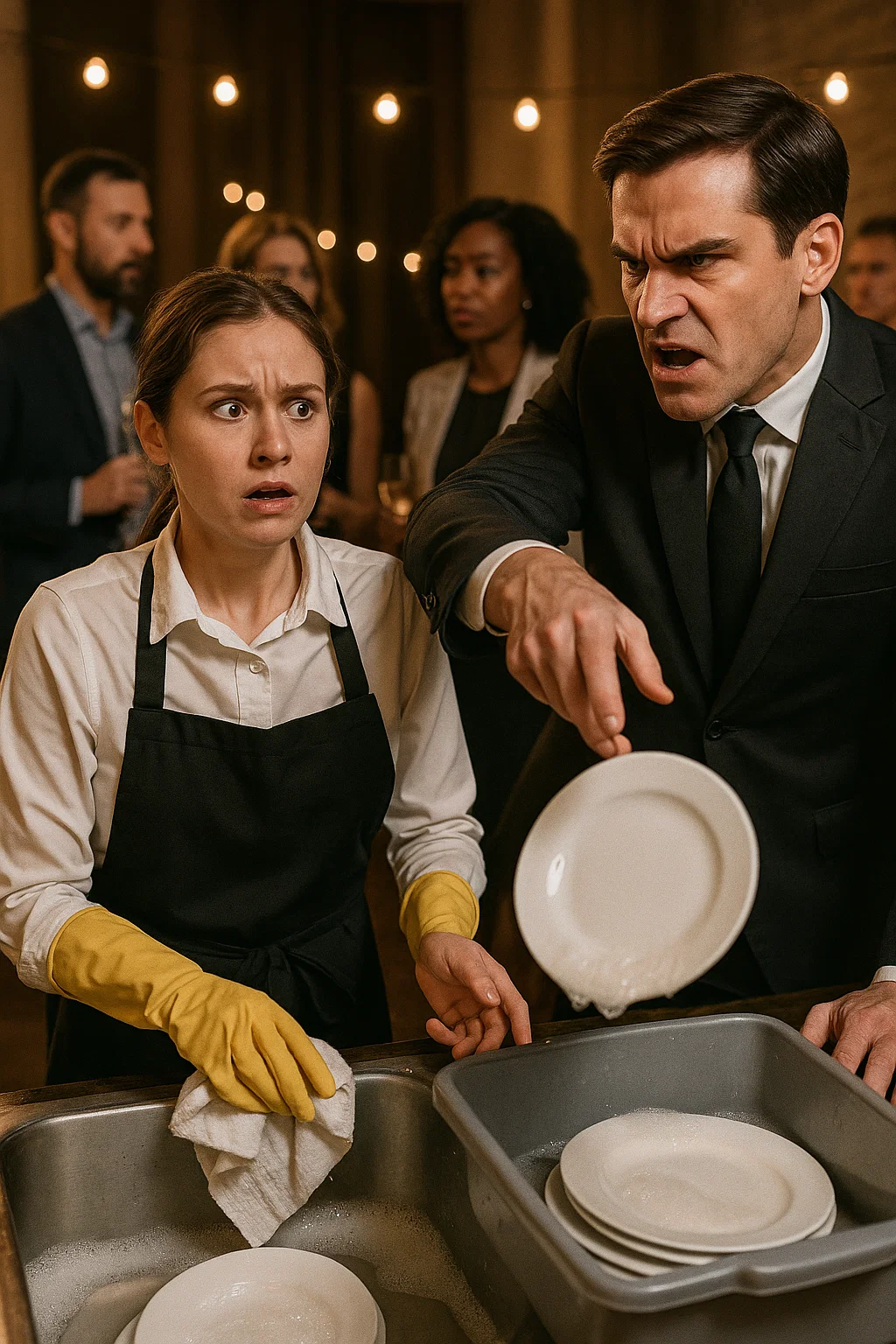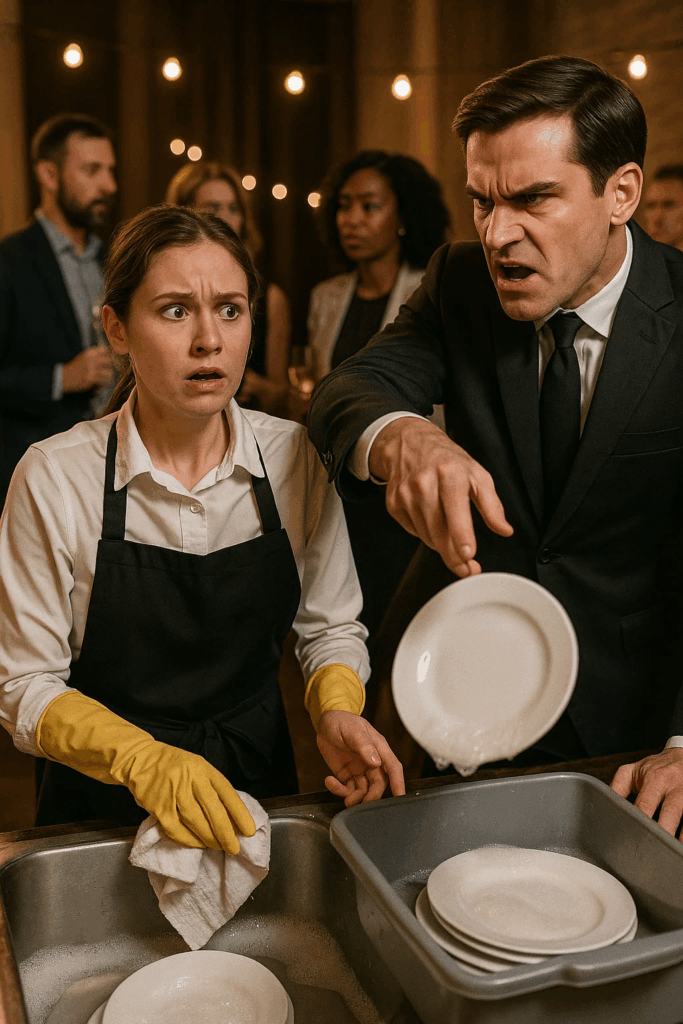They Ordered Me to Wash Dishes at the Gala — Never Guessing the Mansion Belonged to Me
My name is Tessa Cross. And just two hours ago, I was bent over my own kitchen sink, arms stinging from scalding water, scrubbing towers of dirty plates until my fingertips wrinkled. The ache in my calves throbbed with every step across the tiled floor, my hair scraped into a messy bun, my bare face shiny with sweat. With a plain apron tied around my waist, I looked like just another overworked member of the catering staff—not the hostess.
What made it surreal was knowing that only a few stories above me, the glittering Cross Foundation Gala was in full swing. Hundreds of guests swayed beneath chandeliers, champagne in hand, sequined gowns brushing polished marble. A grand wall of orchids and roses spelled out “The Cross Foundation” in looping script, providing the perfect backdrop for staged smiles and flashing cameras.
It was my home. My party. My idea.
And yet, to them, I was invisible.
Because I wanted to be.
That night, instead of dressing in silk and diamonds, I slipped into a plain catering uniform—black pants, simple polo, borrowed apron—and blended into the staff. I vanished into the kitchen before the first guest arrived, disappearing into the flurry of trays, pitchers, and clattering dishes.
Why?
Because for weeks, my husband Nathan had been warning me. He said many of the people in his circle lived double lives—shaking his hand with smiles, then gossiping behind his back. Women who wrote checks for charity but sneered at anyone not carrying a designer bag. “They don’t show up for the cause,” he told me. “They show up to be seen.”
I needed to know if he was right.
So I put myself in the position of the people they barely noticed—the ones they spoke freely in front of. I wanted to see who they really were when they thought no one important was watching.
It didn’t take long.
The first blow came from a woman in a ruby-red gown. She snapped her fingers at me when I didn’t produce her preferred wine fast enough.
“You people really need better training,” she sighed, not even meeting my eyes.
You people. The words cut deep.
Later, the event planner we’d hired—Sasha, who charged small fortunes for every “extra”—stormed into the kitchen, headset askew. She jabbed a manicured finger at me.
“Hey, apron girl! Table six still doesn’t have water. Why are you standing there?”
I swallowed my pride and obeyed. Carrying a pitcher across the ballroom, I felt the sting of sidelong glances. Guests looked right through me. Some forced polite smiles, the kind you’d give to an elevator attendant. Most ignored me entirely.
At the dessert table, Eleanor—a socialite draped in pearls worth more than most people’s homes—beckoned me closer.
“You’re far too slow with the shrimp,” she scolded. “Didn’t anyone teach you coordination? And honestly, dear, smile. Staff who sulk look dreadful.”

So I forced a smile.
“Much better. Actually—never mind. Go handle the dishes. You seem more suited for that.”
The irony nearly made me laugh.
Back to the kitchen. Back to my own sink. Back to the hallway lined with family portraits and the anniversary painting Nathan had given me. Still, I scrubbed and stacked, soap stinging my hands, while the sound of music and laughter floated down the vents like a cruel reminder.
I hadn’t expected kindness, but the cruelty rattled me. These people delivered speeches about generosity, yet treated those beneath them as invisible. It wasn’t charity—it was theater.
I was rinsing the last plate when I heard a voice cut across the ballroom.
“Excuse me… has anyone seen my wife?”
Nathan.
The casual tone carried, but underneath was a thread of steel.
“She was supposed to meet me by the dessert table,” he continued, sharper now. “It’s been twenty minutes.”
I edged out of the kitchen doorway just as he stepped into the center of the room, tuxedo immaculate, champagne glass poised. Conversations faltered. Faces turned.
Sasha rushed forward. “I—I haven’t seen her, Mr. Cross.”
Eleanor gave a dismissive chuckle. “Perhaps she got distracted. You know how wives are.”
Nathan’s smile didn’t reach his eyes. “Perhaps. Or maybe… she’s downstairs. Washing dishes.”
The room froze.
You could hear the hum of the chandeliers.
And then his eyes found me.
Standing there in an apron, hair damp from steam, hands raw from soap.
His expression softened. He crossed the room, untied my apron himself, and gently dried my hands with his pocket square. Then he kissed my forehead.
“Ladies and gentlemen,” he said, voice carrying effortlessly, “this is my wife, Tessa. The woman this gala was created for. The partner who built this life, this home, and this foundation with me.”
A hush fell. Eleanor paled. Sasha’s headset slid down her arm.
“She was in the kitchen?” someone whispered.
“She was scrubbing dishes?”
Nathan’s jaw tightened. “Yes. She wanted to see tonight from the perspective of the staff. I didn’t know she would, but I think it was brilliant. And from what I’ve gathered, not everyone passed her test.”
A ripple of unease spread across the tables. Eyes dropped. A few shifted uncomfortably in their chairs. Sasha excused herself in silence, cheeks blazing. Eleanor clutched her pearls as if they might save her.
Nathan laced his fingers through mine and led me onto the stage.
“One thing needs to be clear,” he declared. “Outfit or not, apron or gown, Tessa is the most important woman in this room. If anyone treated her as anything less tonight, perhaps you should rethink whether you understand charity at all.”
It wasn’t scolding. It wasn’t anger.
It was truth.
And this time, no one dared argue.
When the last guest drifted out and the chandeliers dimmed, Nathan and I sat together on the patio, the mansion glowing softly behind us, stars scattered above.
“I’m sorry,” he murmured, wrapping my hand in his. “I didn’t realize how cruel they’d be.”
“I needed to see it,” I said quietly. “Not for you—for me. To remind myself that kindness is worth more than glitter and titles.”
He kissed my hand. We stayed in silence, letting the night breathe.
By morning, Nathan’s words had gone viral. Someone had filmed the moment, and the clip raced across social media. My phone lit up with messages—some apologetic, others from strangers thanking us for the lesson. Donations to the foundation doubled overnight.
Sasha resigned. Word spread that she was opening a bakery—“to learn humility,” people joked.
Eleanor sent flowers. Twice.
And me? I kept the apron. It hangs in my closet beside gowns worth a fortune.
A reminder that once, the wealthiest woman in the room was the one scrubbing dishes—taking notes.


